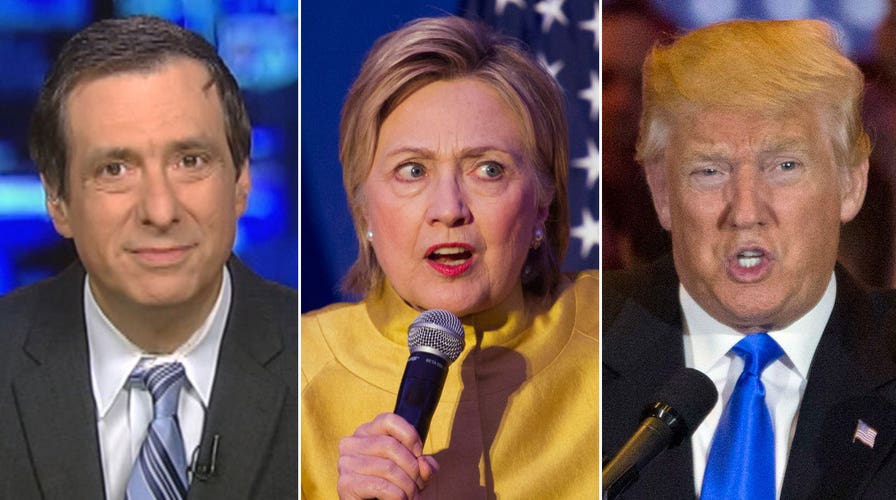Kurtz on Trump vs. Hillary: Is the press wrong again?
'MediaBuzz' host reacts to pundits saying Trump can't win 2016 election
Now this is fascinating: All the pundits who got Donald Trump so wrong are now telling us how hard it will be for him to win a general election, or holding forth on what he needs to do this fall.
As if they had not just been part of the greatest journalistic misfire in modern political history.
The press, in other words, is facing a credibility gap.
Now that doesn’t automatically mean that the prognosticators are wrong this time. But it suggests the need for a little humility.
It’s undoubtedly true that Trump faces an uphill battle against Hillary Clinton. Any Republican would have to grapple with a daunting Electoral College map that has come to favor the Democrats, which is why they have won the popular vote in five of the last six elections.
As Chris Cillizza has pointed out, if Hillary wins the 19 states (plus D.C.) that have voted Democratic in the last six presidential elections, plus Florida, she’s got more than 270 electoral votes. And if she doesn’t win Florida, there are several other combinations of states that could put her over the top.
But those who thought Trump didn’t have a chance in hell (and Cillizza is among those who have cheerfully admitted that) may be miscalculating again.
Trump has high negatives (especially among women and Hispanics), but he managed to bring those numbers down during the primaries.
Trump has no political experience, but he engages in asymmetrical warfare of the kind that can drive opponents crazy—especially a less-than-nimble candidate like Clinton.
Trump is strongly opposed by pundits on the right and the left, but he turned that to his advantage this year by running against them and an unpopular media establishment.
Just to give you the flavor, here’s a National Review piece yesterday by David French:
“The party of Lincoln is in ruins. A minority of its primary voters have torched its founders’ legacy by voting for a man who combines old-school Democratic ideology, a bizarre form of hyper-violent isolationism, fringe conspiracy theories, and serial lies with an enthusiastic flock of online racists to create perhaps the most toxic electoral coalition since George Wallace…
“Trump is the destroyer of conservatism, and he will taint all who take his side.”
And here’s a Salon story yesterday by Simon Malloy, who admits that he was among the many commentators who was “completely wrong about Trump”:
“The widespread dismissal of Trump 2016 stands out as one of the more significant media failures of the past year, and it’s good that at least a few people are willing to circle back and figure out why they blew it…
“Already we’re seeing high-profile reporters and pundits who are grubbing for access to Trump by sugarcoating or rationalizing his belligerence and bigotry. The urge to provide Trump the same deference and treatment one would a mainstream politician will be strong. But that gives the Republican nominee more credit than he’s due, and it pushes to the background everything that makes Donald Trump the malignant political force that he is.”
Trump, for his part, is reaching out to the party establishment and trying to mend fences, with mixed success. Some Republicans are softening their opposition to him, while others are with Paul Ryan in withholding their support, or George W. Bush and George H.W. Bush in making clear they will never support him. This could have something to do with Jeb, but also with Trump’s criticism of the Iraq war and divorcing himself from the Bush brand of Republicanism.
Maybe, in some way, these establishment snubs help underscore that Trump is a different kind of Republican.
The billionaire faces the challenge of setting up a national campaign apparatus and fundraising operation. But the more fundamental question is whether his positions will have far less appeal outside the narrower bandwidth of Republican contests.
On hot-button issues like immigration, probably so. But keep in mind that Trump is also running as a businessman who knows something about creating jobs and is opposed to the kind of trade deals that have hurt many working-class voters.
He is also running as a Republican who is vowing to protect entitlement programs and is downplaying the importance of social issues.
The press just hasn’t had to deal with this kind of GOP nominee in a very long time. And that’s why Trump could win over what used to be called Reagan Democrats, or at least their kids.
Oh, and Hillary has pretty high negatives as well.
Still, his ambition of putting in play such traditionally Democratic states as New York and Pennsylvania may prove to be unrealistic, and so the electoral math may still be against him.
Now the press is getting caught up in VP talk. Will Trump pick Kasich, Rubio or Christie? Will he go for a female governor? We don’t know—right now, he doesn’t know—so it’s sheer speculation at this point.
But the press should be careful about judging the fall campaign based on the usual political assumptions. Trump, you may have noticed, has spent the last year smashing those assumptions.





